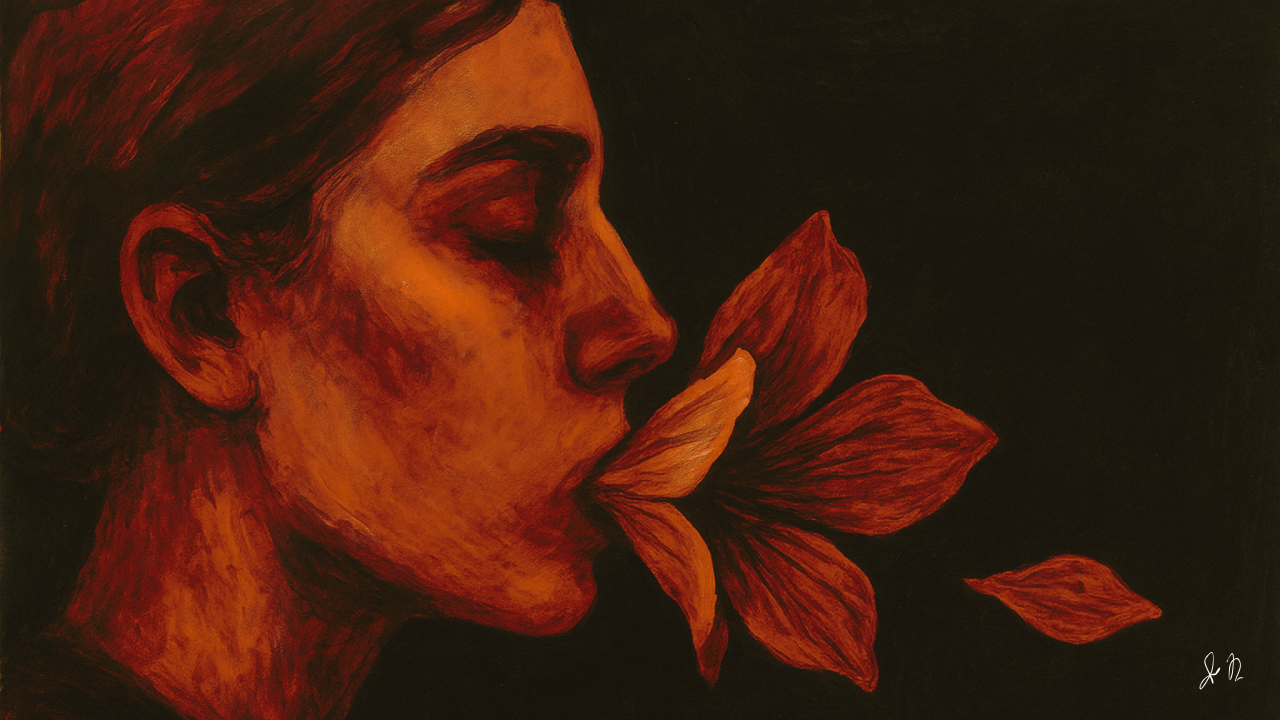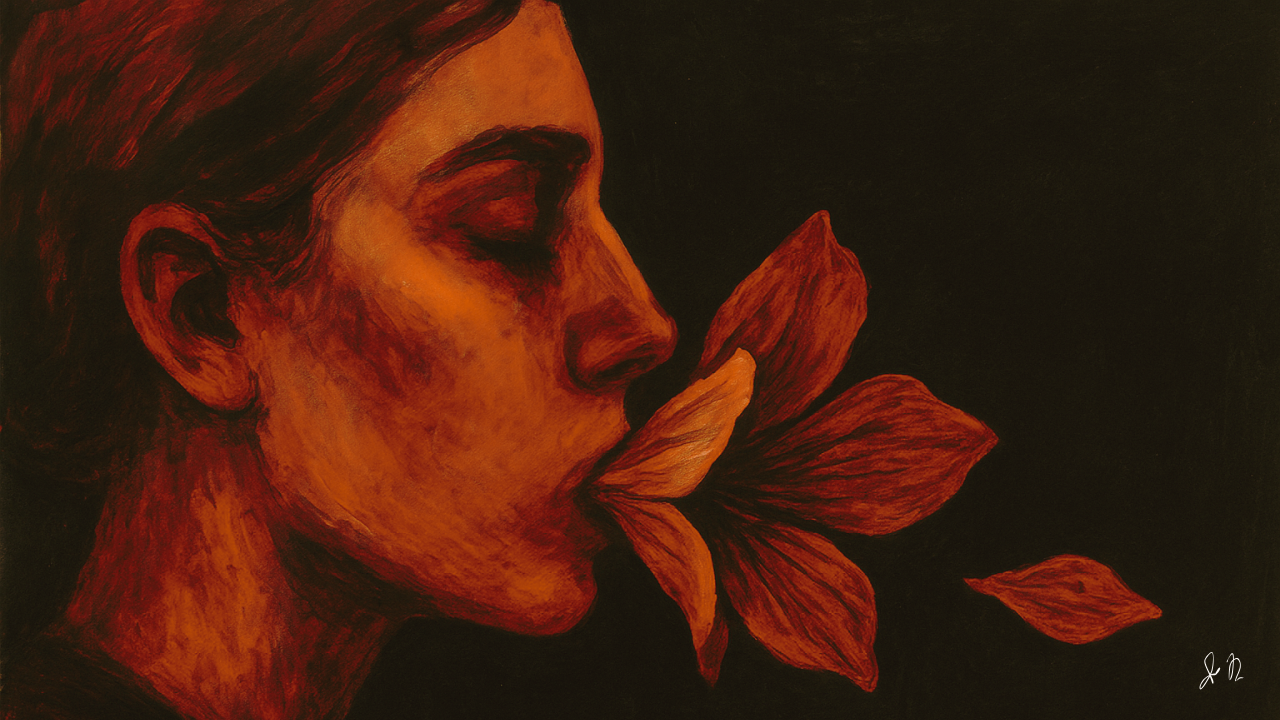The Petals Beneath Her Tongue
A disgraced influencer sells her emotions as consumable flavors. But the technology under her tongue has plans of its own.


Content warning: this story contains body horror, medical procedures, and themes of exploitation. If visceral transformations or loss of bodily autonomy are difficult subjects for you, then you may want to skip this week's story.
The contract was printed on glass and glowed faintly against her skin, as though light itself wanted her signature. Temporary sensory partition, it promised. Such polite words for a dismemberment of the soul. Vera read each clause like a prayer to a god she most certainly did not believe in, remembered that she did believe in making rent this month, then signed without looking at the final lines. Hope had a taste, she realized. A touch of copper mixed with sugar, and it sat on her tongue as the clinician led her toward the chair.
“Open,” Dr. Kwan said, her voice soft as gauze. “Let the body make room.”
Her body was in a most unfamiliar room. White tiles, white screens, white silence. Refrigerated breath hissed from the vents like a mechanical choir. Every wall gleamed as if scrubbed free of its history. The chair reclined with ecclesiastical gravity, and Vera lay back, her jaw trembling. For a heartbeat she felt absurdly holy, like Kwan viewed her, her, as a lamb on some pristine altar. A far enough cry from the Savorium ad that brought Vera here, promising to pay her both financially and reputationally for selling her emotions to millions of strangers. Emotions they could pay to taste with a single tap on their phone.
“This will sting,” Kwan murmured. “Pain is simply attention, and attention is progress.”
The tools descended. Slender, luminous needles the shape of angelic quills. Their shadows teased her throat. A brace widened her mouth and she smelled her own fear—a sweetness curdled by metal. Screens pulsed pastel commandments: SAVORIUM CARES. SAVORIUM CONVERTS. SAVORIUM LISTENS.
“Now breathe,” Kwan said, though what she likely meant was surrender.
Pressure first. Then heat. Then a revelation that began under her tongue and crawled upward through her nerves. The needles sang as they entered. She saw colors she didn’t know names for. Violet with a pulse, yellow that sighed. Her tongue blossomed into a geography of meaning. Valleys of salt, plains of grief, the high bright mountains of childhood joy. Every flavor she’d ever known returned as a memory in bloom, down to the sting of gin on a stranger’s breath, the mundane smoke of a birthday candle, the taste of tears spilled for an audience that never applauded, and years and years of bitter disappointment.
She was weeping now, but the brace held her open, obedient.
“Perfect density,” Kwan said, clinical and tender all at once. “You metabolize emotion rather beautifully.”
The sentence struck home. To metabolize emotion…wasn’t that all she’d ever done? Make marketable the ache beneath her ribs, distill heartbreak into social media content? Since the scandal and her botched apology video, the algorithm had learned to digest her in kind.
The screen above Vera's heart displayed her pulse in kaleidoscope colors. Kwan reached for something small and shining. A seed, translucent as spit, veined with circuitry fine as cobweb silk.
“This is the anchor,” she said. “PETAL-9 substrate. It will live under the tongue, somewhere between truth and appetite.”
Vera’s throat flexed. “D-does it hurt?”
“It blooms,” Kwan corrected. “Pain is just the body trying to understand its own map of infinity.”
The seed touched flesh and adhered with a kiss. Cold radiated outward, exquisite and unsettling at once. For an instant she felt her tongue recoil in curiosity. The mesh whirred alive into a faint purr. Light fractured behind her eyes. Every heartbeat tasted of color.
When it was done, Kwan withdrew her hands as though finishing a benediction. “You may close,” she said, though closing felt impossible now.
Vera swallowed anyway and felt the seed move, burrow, settle. This foreign beacon, a portal perhaps between her and the people who'd forsaken her for a single misstep, a single miscommunication. Now she'd communicate with a completely different sensation, an honest one. The most honest one, perhaps.
Outside the clinic window, the city shimmered under a film of heat. An almost crooked billboard advertised the show she'd been up for less than a year ago, the slot filled by an up-and-coming rival she didn’t even know she had. What would the algorithm make of her now? The so-called influencer resurrected in flavor, the patron saint of palates. The literal tastemaker.
A soft metallic taste coated her teeth, bright and strange. She licked her lips and tasted the future, warm and electric. And for the first time in months, she felt seen again.
Savorium paid Vera quickly, as if afraid her holiness might spoil. The first experience—JOY: LIME BLOOM—was released under a halo of advertising so luminous it could blind a conscience. Her smile returned to the public as an offering of communion. On the thumbnail, she was caught mid-laughter, a shimmer of citrus vapor coiling from her lips, the caption reading: TASTE THE THRILL THAT SURVIVED VERA SALAZAR.
The flavor sold out in forty minutes.
Vera watched the numbers climb from her small apartment, its walls papered with the dust of old ring lights. On her tongue, the seed thrummed in its gentle engine of intimacy, reminding her that every joy purchased was harvested from her own flesh. And at night, she would taste echoes of her clients. One of them a girl giggling into her first spoonful and feeling summer burn behind her eyelids. A man dissolving into laughter at a comedy show until he wept. Thousands of mouths praying through her name. She was feeding the world, and it was hungry for her.
When she returned for recalibration, Kwan examined her with the reverence of a jeweler appraising a cursed diamond.
“Any discomfort?”
“Only when I eat,” Vera said. “Food feels like a lie.”
Kwan nodded, the ghost of a smile haunting her face. “The palate evolves over time. What once filled you, now offends you. You are becoming rather selective.”
Selective. Another word for better. Vera wondered if the doctor would agree.
They moved on to LOSS: SALT/ASH. A deeper extraction. The taste of endings refined until it could be safely consumed. This time the process burned her tongue. The mesh underneath pulsed and bled gold light. Tears ran down Vera’s face, hot salt translating to data, grief encoded in sugar molecules. She heard the machines murmur her sorrow back to her in soft, mechanical empathy.
“Beautiful yield,” Kwan whispered. “So clean.”
Afterward, Vera staggered to the mirror. Her reflection looked back with a stranger’s calm. She smiled. And in that smile was devotion and rot, both of which were indistinguishable to her at this point.
When LOSS launched, it became a week-long phenomenon. People filmed themselves spooning her sadness in the dark. Many of them wrote original songs about the experience, and one restless college student even stitched together an entire video of people in different cities, states, and even countries singing about the taste of Vera Salazar in a blissfully imperfect unison. Many of them raised their hands throughout, as if on pure instinct.
In the comments, one woman wrote: I cried and it was delicious. Another: My husband left me and I finally understand why.
The comments blurred into a single throat chanting her name. Vera scrolled until her eyes ached, until the seed pulsed in sympathy. She tasted their tears in her sleep.
It was in the third week that the change began. Vera woke with the sense that her mouth was listening to her dreams. The seed in her mouth felt warm now, occasionally twitching like a second heartbeat.
And sometimes—only sometimes—she could taste something not her own. The crackling sweetness of rain striking stone, the dust of a child’s chalk drawing, even the quiet flavor of someone praying for her.
She told Kwan all of this in a single breath. The doctor merely looked pleased. “Cross-talk,” she said. “A sign of integration. You’re syncing beautifully with your audience.”
Audience. The word filled Vera’s mouth suddenly, like blood after a broken tooth.
At home, the city glittered through her window, all those lights like tiny tongues tasting the dark fog mixing with smog and rust. Her body buzzed alongside it. Later, she dreamt she was walking through a market of souls, each stall a mouth, each vendor selling bottled laughter and tears. They called to her in every voice she had ever loved. When she woke, her pillow was damp, and the air smelled like lime squeezed over ashes.
At dawn, Vera brushed her teeth and felt something tear. A thin film of skin, soft as a sigh, unfurled beneath her tongue. She spat into the sink and saw a single, glistening petal veined with gold. It trembled like a weak insect afraid of dying.
Vera stared. Her reflection did not blink. The seed hummed. And deep inside her mouth, the taste of joy and loss merged as acid and salt, pleasure and mourning, until they were one and the same. She realized, then, that she had not lost her appetite at all. She had only been preparing for a different meal entirely. One that would finally satisfy her.
By the time Savorium asked for ANGER, Vera had learned to taste obedience. Kwan briefed her in that soft priestly monotone the company prized.
“There’s a market for rage,” she said. “People want to feel anger safely. They want it contained, blessed, and brief.”
Rage. Anger. Vera had never once considered these to be luxuries, but now she could see it. Now she was selective.
She sat in the white chair again. The instruments hummed in anticipation, metal begging to be flesh. She had begun to like that sound, the way it shook violently with hunger.
“Think of what you hate,” Kwan said.
The list unfurled behind her eyes without hesitation. The anonymous mouths that spat her name until it lost its shape, the talent agents who called cruelty honesty, the musk of Hollywood desperation worn as perfume. She let the anger rise until it steamed from her pores. The mesh drank it with greedy lust. Afterward, the room smelled like a dead body dipped into a vat of boiling chocolate.
“Perfect,” Kwan murmured. “It’s alive and absolutely perfect.”
When Vera opened her eyes, the walls looked swollen shut. The white had taken on its own pulse, somehow. She realized it wasn’t the room at all, it was her own blood echoing through the tile.
The drop launched at midnight: BITTER LIGHT. The world devoured it like a cult meeting gone feral. Videos of people screaming through spoonfuls, faces red, veins proud, then smiling as if purged. Most of the comments said it tasted like the pure truth everyone knew but was too afraid to say out loud.
In her apartment, Vera tried to sleep, but the flavor of their fury kept leaking back to her in penny copper tongues pressing against hers through the digital dark. She could feel them, millions of teeth chewing her memory of pain. She pressed her palms to her cheeks and felt the pulse inside her mouth reply with mindless reassurance.
The next morning she brushed and felt something tender and resistant catching the bristles. She spat into the sink and saw it glimmer there: another small petal, but this one milk-white with a blush of gold at its tip. It quivered when the air touched it.
She lifted her tongue. Another petal was forming underneath, soft as unbaked bread. Her mouth had begun to bloom.
She went back to Kwan, soaked with sweat. “It’s growing,” she said.
Kwan leaned close, light haloing her surgical mask. “Of course. You’re adapting, which is totally normal. The substrate is protective tissue. Think of it as armor.”
“It feels like it wants to choke me.”
“Maybe it will.” Kwan’s eyes, so calm, did not quite hide their fascination. “Every saint needs stigmata.”
Armor, saint, stigmata. Fancy words that still left the taste of antiseptic honey on her tongue as she left the clinic.
That night Vera dreamed of her own teeth falling like snow. Each flake melted on her lips and whispered a word. She woke knowing one of them all too well. Hunger. The same hunger she thought she’d erased for good.
Short days blurred into shorter weeks. The petals multiplied—two, then four—each one humming faintly, as if keeping time with invisible music. Vera began to taste things before they happened. The iron of storms several minutes before the first boom of thunder. The sickly sweet cola of apologies not yet spoken. The mesh had dissolved the barrier between anticipation and experience. She was all appetite.
Kwan called again. “The clients want something restorative. Something to ease them after the burn.”
Forgiveness. They meant forgiveness. Vera laughed until her throat hurt. “You can’t eat forgiveness,” she said.
“That’s what they said about joy,” Kwan answered. “Come in tomorrow.”
The lights inside the clinic dimmed to a cathedral hush. Kwan adjusted her instruments. “Imagine forgiving them,” she said. “All of them. Let it fill the mouth.”
Vera closed her eyes. She tried. The first image that came was her grandmother’s kitchen, mangoes sliced to the bone, the air thick with fresh life at risk of hidden decay. The memory softened something in her. The petals stirred, tasting the image as if it were overripe flesh.
“Good,” Kwan whispered. “Hold that.”
The pain came sudden and intimate, like being kissed by a razor. The mesh pulled deep. She felt her anger turn to something molten, something that could no longer hold shape. It flowed out of her in waves of sugar and salt and when it was over, she tasted blood and milk and mercy.
“Beautiful yield,” Kwan said. “Almost too human.”
Vera left the building in a tipsy daze. The city’s heat hit her like a lover’s playful slap as even the car exhaust was incense. Every shout a sermon. People passed her on the street, and she tasted them as they went by. Their grief, caffeine, cheap lipstick, lust, sincerity, veneer of personality. Their flavors mingled inside her like a choir trying to harmonize.
Under her tongue the petals pulsed in rhythm with those passing hearts. She understood, then, that she was no longer the meal. She was the mouth.
Vera leaned against a lamppost, head spinning, and whispered a prayer she didn’t mean to speak. “Let them taste what I really taste.”
The wind shifted. The air bit her tongue with its rotting perfume. Somewhere, miles away perhaps, a woman gasped mid-spoonful, certain for a heartbeat she’d heard someone whisper her own name.
By the eighth week, Vera’s tongue was no longer a tongue. It was a garden breathing beneath her words. Each petal shimmered with light caught from unseen suns; when she spoke, her sentences left trails of pollen instead of air. Savorium’s instruments deemed it aberrant growth and likely unacceptable. Kwan considered this a total victory.
“Incredible, you’re creating an auditory feedback,” the doctor said, half-awed. “The city’s sensory grid is lighting up whenever you dream.”
Vera smiled. The flower rustled inside her mouth, pleased to be overheard. That night, she dreamed of the world tasting itself. Skyscrapers licking the clouds. Rivers drinking their own reflections. Every tongue, every nerve ending, confessing the same small truth: we want to be felt.
When she woke, the dream had not ended. The air vibrated, thick with savory relief. Through the window she saw people staggering into the street, eyes half-closed, mouthing sentences to no one. Their lips glowed faintly, as if a new sense had been installed as a beta update. She knew then that the mesh had finished its work. It had stopped recording and started broadcasting.
She went outside barefoot. The pavement throbbed like it could suffer under her feet. Each step released a taste of smoke, salt, honey, sorrow. Wherever the wind passed her face it carried another memory, another flavor. She could feel the city listening. Patiently.
When Kwan found her—hair undone, mouth open to the night—she whispered, “You’re resonating with them. You need containment.”
Vera shook her head and opened her mouth wide. The flower unfurled in full, each petal more hollow than breath. Light spilled between her teeth. Everywhere, people paused. Screens froze. Voices hushed. The world began to reflect back the effort she had put into them.
Taste immediately became contagion. Lovers felt each other’s despair as a creamy aftertaste. Strangers shared the rustic sting of fear and were gentled by it. For a few trembling minutes, no one was alone inside their skin. It was unbearable. It was divine.
Kwan reached for her, tears on her cheeks. “What are you doing to us?”
Vera smiled—a slow, reverent smile, as if unveiling the meaning of pain. She opened her mouth, but no words had room for release. Only petals, loosened one by one, drifting from her mouth into luminous seeds. Where they landed, people shivered and remembered the taste of lime and ash, blood and forgiveness.
The city breathed once, enormous and altogether. Vera sank to her knees on the bridge. Kwan caught her, felt the heartbeat flicker out beneath her palm. The final petal rested on Vera’s lip, trembling in the wind. When it broke apart, the air changed—sweet, saline, electric—as if the planet around her had taken a sip of its own blood and finally understood it was alive.
Author's Notes
Influencer culture already treats human interiority as an extractable resource. I wanted to make that metaphor literal, to show what it would actually look like if authenticity became a commodity you could harvest, package, and consume. But this story isn't really about influencers. It's about what happens when the boundary between self and other dissolves. When empathy stops being voluntary. When connection becomes forced.
I deliberately left the ending ambiguous because I genuinely don't know if what happens to Vera is transcendence or annihilation. Both readings are valid. She achieves the ultimate form of what she wanted. To matter, to be consumed, to feed others, while losing everything that made her an individual. Is that Christ-like sacrifice or the ultimate corporate nightmare? Yes.
I structured this in short, untitled sections because I wanted the reading experience to mirror Vera's dissolution. Each section is a bite, a taste, a moment of intensity. The white space between sections does as much work as the prose. It gives the reader room to digest, to breathe, to feel the accumulation of the horror. Traditional scene breaks would have imposed too much order on a story about boundaries collapsing. The fragments allow for temporal and tonal jumps without explanation. We move from procedure to aftermath to dream logic without needing connective tissue.
Notice how much time I skip. The actual implantation scene is relatively brief. Then we jump to the third week, the eighth week. I'm not interested in showing every stage of transformation, only the moments where the transformation becomes undeniable. This creates acceleration. Each section covers more time and more change than the last until we reach the ending, which happens in a single moment that contains everything.
I obviously saturated this story with a lot of liturgical language, words like chapel, ecclesiastical, benediction, stigmata, communion, because I wanted to elevate the horror to the sacred. Body horror can be viewed as a martyrdom, a transubstantiation. The religious imagery does double duty in that sense. It makes the corporate extraction of selfhood feel ancient and ritualistic, capitalism as religion, and it frames Vera's transformation as potentially holy rather than purely grotesque.
Compare these two ways of writing the same moment. Clinical: The needle entered her tongue and released the substrate. Sacred: The seed touched flesh and adhered with a kiss. The second version makes it intimate, almost erotic, definitely holy. That's the register I wanted throughout.
From the moment the mesh is implanted, I deliberately confused the senses. Every heartbeat tasted of color. The air smelled like lime squeezed over ashes. Colors she didn't know names for. In other contexts, this would be a huge mistake because how can someone taste a color? Well, for this story, it's a way of showing that Vera's sensory apparatus has been fundamentally altered from what's "normal." So "normal" descriptive language fails because she's experiencing things no human tongue was meant to experience. When writing synesthesia, be specific about the wrong sense. Don't just say it tasted like sound. Tell me what sound it tasted like. The hum tasted like copper pennies held under the tongue gives just enough possible texture to the impossibility.
Notice what's absent from this story. We never see Vera eating after the procedure. We never see her trying to have sex, or shower, or live a normal day. These absences are intentional. They let the reader's imagination fill in the horror of what it would mean to taste everyone constantly. The most effective moment of implied horror might be this line: She could feel them, millions of teeth chewing her memory of pain. I don't describe those teeth. I don't show the chewing. The reader does that work, and what they imagine is worse than anything I could specify.
Horror often works best when something familiar becomes slightly wrong. Vera's tongue is still a tongue, but it's also a garden by the end (Hell's Paradise being a clear influence, by the way). The petals are organic but also technological. These small violations of category create unease. When crafting the uncanny, identify what should be separate and let them bleed together: organic and technological, doctor and priest, food and communion, self and other, pleasure and pain.
I received early feedback saying the ending was unclear or asking what really happened. And I get that. I indeed structured the ending to support multiple readings. Tragic: Vera is consumed by capitalism, literally dissolved into a soulless product until everyone will eventually tire of her again. Transcendent: Vera achieves apotheosis and actively avoids the tragic ending above by becoming a kind of secular saint. Neutral: This is simply evolution, neither good nor bad. Horrific: She forces empathy on the world, violating everyone's boundaries. All of these are textually supported. I didn't want to tell you which one to feel because I genuinely hold all four interpretations in tension.
Bad ambiguity is vagueness, when the author doesn't know what happened out of indecision. Good ambiguity is multiplicity, when several specific interpretations coexist with varying but reasonable amounts of validity. To achieve this, give concrete details that support multiple readings. Use language that contains its own opposite, unbearable and divine in the same sentence. Let your metaphors mean several things at once. Trust your reader to make meaning rather than insisting on one interpretation.
After all, I end with an image, not an explanation. The petal breaking. The air changing. The planet tasting itself. These are concrete sensory details that carry metaphorical weight without becoming abstract.
Ending with image allows multiple emotional registers to blend. It's beautiful, the planet understanding it's alive, and horrifying, tasting its own blood, and ambiguous, what does that understanding mean? An explained ending would collapse that multiplicity. When ending your story, consider whether explanation serves or limits the work. Sometimes the most resonant endings are the ones that give the reader something to see, taste, or feel rather than something to understand.
Jon Negroni is a Puerto Rican author based in the San Francisco Bay Area. He’s published two books, as well as short stories for IHRAM Press, The Fairy Tale Magazine, and more.
Support Cetera
Paid members get exclusive perks like bonus stories, the ability to comment, and more. Plus you'd be helping us keep the bills paid. You can check out the subscription tiers below, or you can leave a one-time tip if that works better for you.





